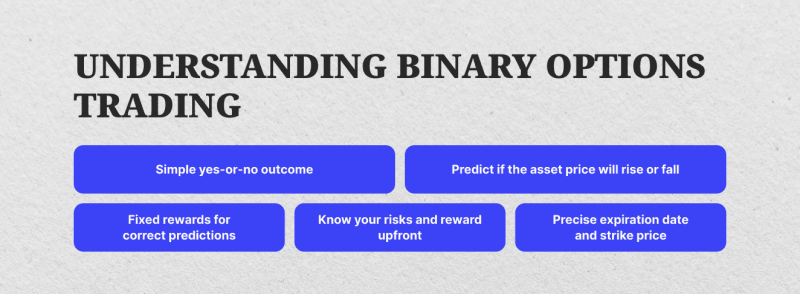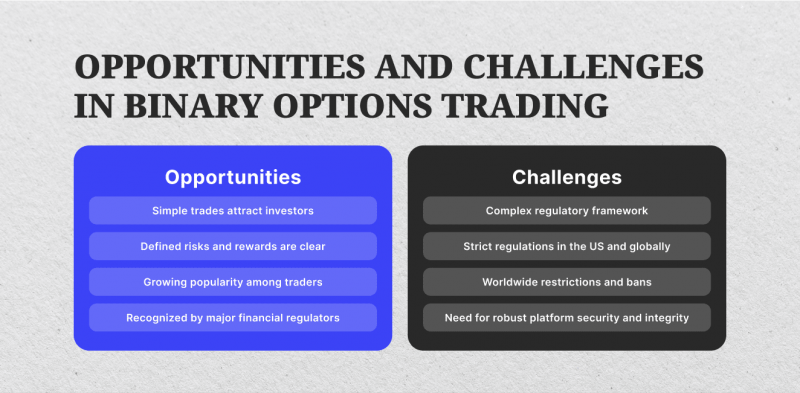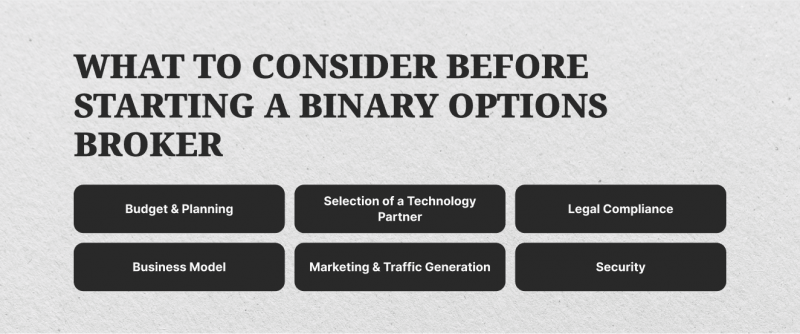How to Start a Binary Options Broker: Detailed Guide
Sep 05, 2024

Several instruments in trading are easy to understand, which might be the reason for their appeal. Binary options can be one example. With it, profit can be achieved by calculating correct market circumstances and competent management.
On the other hand, regulatory compliance has presented several difficulties. Previous problems, like traders losing large sums of money and the growth of unlicensed brokers, have made financial inspectors more vigilant.
Below, we will explain the concept of binary options trading and how to start a binary options broker.
Key Takeaways
- Simple financial instruments with fixed risks and returns are binary options.
- Keeping a broker in operation requires dedication to regulations.
- Choosing a reliable technology partner, varying revenue streams, and maintaining reasonable security are essential for drawing in customers and establishing credibility.
Explaining Binary Options Trading
Binary options are financial instruments in which a straightforward yes-or-no statement determines the outcome. An underlying asset, such as a stock index, commodity, or currency pair, and a strike price are specified in a binary option contract.
On the last day of trading, the trader forecasts if the asset’s market price will be higher or lower than the strike price. Due to the “all-or-nothing” nature of binary options, the trader will get a predetermined reward if their forecast is accurate at expiration. The trader loses the money they put in the deal if their prognosis is incorrect.

Binary options come in several varieties, each with a unique payment structure. Binary options that are either asset-or-nothing or cash-or-nothing are the most popular kinds. When an option expires in the money, the trader’s prediction is accurate, and they receive a specified sum of money in a cash-or-nothing scenario. If the option expires in the money, the trader of an asset-or-nothing option will receive the underlying asset’s value.
Both kinds offer an easy-to-understand method of trading binary options in which the possible profit or loss is immediately apparent.
How Does it Work?
Suppose for the moment that you are wondering if the coin X will go over $1,000 on December 31st, 2024. In this instance, the underlying asset is coin X, with an expiration date of December 31, 2024, and a strike price of $1,000. Anticipating an increase in the value of coin X, you choose to invest a certain sum, say $100, in a binary option contract.
If coin X does reach a price of $1,000 on December 31st, you will get a fixed dividend, such as 80% of your initial investment, or $80. You lose your entire $100 investment if the price falls below $1,000 on the expiration date.
The result in this binary options situation is simple: you either lose your entire investment or gain a particular sum. The risk involved is clearly understood since the payoff is known in advance.
Because the striking price and expiration date are predetermined, the investor is guaranteed to know precisely what to anticipate when the contract expires.
Fast Fact
The US, UK, Australia, New Zealand, Japan, Cyprus, and Malta are just a few major markets where binary options trading is permitted and regulated. By imposing strict guidelines, regulation protects traders’ investments and promotes fair trading.
Opportunities and Challenges in The Market
The simple nature of binary options has led to a noticeable spike in investor interest. This financial product’s simplicity and specified risk, which allows traders to know exactly how much they can profit or lose before making a transaction, make it so appealing.
It is becoming increasingly popular to trade binary options among new and veteran traders due to the CBOE and other significant financial regulators realizing their potential.
The market’s growth has not, however, been without difficulties. The complicated regulatory framework that surrounds binary options trading is one major obstacle.
The Commodity Futures Trading Commission oversees a select few US platforms that are legally permitted to provide binary options, including the CBOE and the Nadex.
Although this strict regulation aims to protect investors from fraud, it also creates obstacles for new brokers looking to join the industry.
Addressing these regulatory procedures, such as getting licenses, adhering to the CFTC’s recommendations, and ensuring their trading platforms match industry standards, is part of setting up a binary options brokerage firm.

In addition, there are differences in the regulations worldwide, with certain nations placing severe restrictions or complete prohibitions on binary trading. Because of worries about market manipulation and the significant danger of traders losing money, regulatory agencies such as the ESMA have restricted or outright banned binary options in places like the European Union and Australia.
These limitations emphasize how binary options brokerage operations must be transparent and compliant to stay out of trouble with the law and keep clients’ trust.
Maintaining the trading platform’s integrity is another common difficulty. A brokerage must offer a dependable, easy-to-use trading environment to attract and keep clients.
This involves keeping live account transactions safe, giving new traders access to the demo account for experimentation, and giving them precise details on payout schedules and expiration dates.
Since most brokers use web-based trading systems, they also need to put strong cybersecurity security measures in place to protect their trader data and stop illegal access.
How to Starting a Binary Options Broker
A clear budget and meticulous planning are necessary when launching a binary options broker. The initial money needed for technology, infrastructure, licensing, and marketing is among the financial requirements. Constructing a platform from the ground up is far more costly, frequently costing between $500,000 and $2 million.
The expenses associated with developing proprietary technology, integrating market data, and setting up infrastructure are included in this process. On the other hand, white-label solutions present a more economical choice, enabling brokers to leverage an already-built platform at a reduced expense, often ranging from $50,000 to $250,000, depending on the customization requirements.

Finding a Technology Partner
Choosing a trustworthy technology partner is essential to starting a profitable binary options broker. The trading platform is the hub of your business and directly impacts your customers’ trading experience.
Binary options trading platforms should have a user-friendly interface, strong security measures, and quick execution times. The platform should support multiple financial instruments, including currency pairs, indexes, and commodities like crude oil.
For your clients to have a flawless experience, the platform must be scalable and handle high transaction volumes without experiencing any downtime.
Criteria for Selecting
- Consider the following elements when making a decision:
- Seek a partner with a strong background in the financial sector and a track record of creating trading platforms.
- Examine the partner’s standing in the industry and review client testimonials to assess their dependability and credibility.
- Verify that the partner prioritizes data security and abides by industry rules such as the CCPA and GDPR.
- Determine how much development, license, and continuing maintenance will cost to ensure it fits your budget.
- The platform should accommodate growing user counts and trading volumes without sacrificing performance.
Ensuring Legal Compliance
As mentioned above, it’s impossible to succeed in this sector without following regulations. Legal and regulatory standards must be strictly followed to operate a binary options broker.
Most jurisdictions require licensing, which involves extensive application procedures with financial watchdogs such as the CySEC or the CFTC in the US. These regulators mandate that brokers follow thorough KYC and AML protocols, maintain sufficient capitalization, and submit background checks.
Building Your Business Model
Several sources of income are available to a brokerage, and let’s break them down. Trading commissions are generally calculated as a percentage of the trade, regardless of profit or loss.
Brokers may also provide VIP accounts with discounted commission rates in return for a yearly or monthly charge. Offering a portion of the profits from their trades to entice high-value clients can also be achieved through affiliate programs and the introducing brokers.
Establishing a lucrative business plan that meets your target market’s demands and trade preferences is crucial.
Let’s sum up several key points:
- Diversify your sources of income by looking into things like platform fees, partnerships, and instructional goods in addition to trading commissions.
- Establish your target market, adjust your offerings appropriately, and concentrate on methods for attracting and keeping new customers.
- Maintain tight regulatory compliance, conduct exhaustive risk assessments, and put strong fraud prevention measures in place.
- Work together with other financial organizations to broaden your clientele and provide supplementary services.
- To encourage loyalty, offer clients cutting-edge trading tools, excellent customer service, and instructive materials.
Marketing and Generating Traffic
To draw in and keep traders, you need a strong marketing plan. Digital platforms like social networking, PPC advertising, and SEO are helpful strategies for increasing traffic to your trading platform.
Additionally, by incentivizing third parties to recommend people to your firm, an affiliate network can help you grow your clientele. Prioritizing customer retention via instructional resources, engagement programs, and superior trading experiences is equally crucial.
Consistent bonuses and promotions motivate traders to stay engaged on your platform.
Security Considerations
An essential component of managing a binary options broker is security. Ensuring data privacy and safeguarding client funds ought to be primary concerns.
Implementing robust cybersecurity measures, such as encryption, secure servers, and frequent security assessments, is crucial. To protect traders’ money even in volatile market conditions, brokers must also abide by rules requiring segregating client cash from operating accounts.
Consistent system updates and vulnerability monitoring are crucial to avert security breaches that may jeopardize your firm’s reputation.
Last Remarks
Even if binary options carry risks, the likelihood of creating a successful binary options broker can be greatly increased by paying close attention to regulation, compliance, and client trust.
When executed correctly, your business can serve traders looking to make minor trades, pay their utility bills, and make well-informed selections within the time constraints that typical binary options allow.
Long-term success in this harsh financial instrument market requires following some important lessons.
Wondering how these solutions can boost your business?
Leave a request, and let our experienced team guide you towards unparalleled success and growth.




